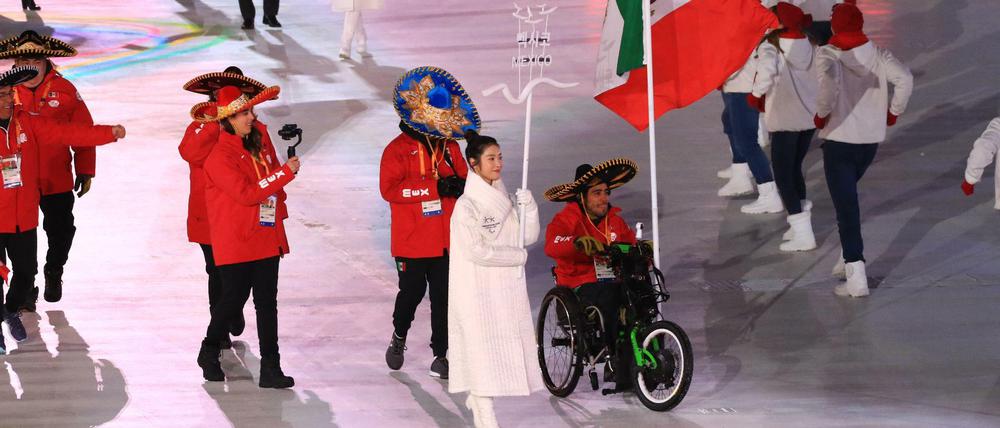
© Thilo Rückeis
Exotic Teams at the Paralympics: Sombreros in the Snow
New and exotic athletes at the Paralympics, and how one Mexican Paralympian loves and lives skiing - bute hates the cold.
Whilst not strangers to snow, for the first time in history North Korea and Georgia have brought athletes to the Winter Paralympics - two athletes each - and Tajikistan has made its Paralympic debut with one athlete competing in the cross-country skiing.
One tropical winter athlete to look out for is Brazil’s Cristian Ribera. At 15 years of age he is the youngest Paralympian in Pyeongchang, and with a sixth place in the Men’s cross country long-distance sitting owns Brazil’s best performance at a winter Games so far! Ribera was introduced to this snow sport through the Agitos foundation, a development arm of the IPC, and the Snow Brazilian Confederation.
Arly Velasquez, 29, from Mexico-city is the only Mexican competing this year. He not only competes in the sit-ski alpine races, but is also his own team manager, marketing person, logistician and administrative assistant, he even builds his own monoskis! How does he manage all of this? Through shear hard work and energy. “I’m super flexible, I’m Mexican, I can adapt to anything and make the best out of any kind of situation” he replies, smiling. This also applies to the cold weather which Velasquez is getting more used to; “in the beginning it was terrible and now it is just bad!”
“There’s no winter culture in Mexico”
Supporting him are good friends he has met along his way, Romarico Cibrian- his assistant, Velentina Canton-his physiotherapist and Marcel Kuonen-his coach and ski technician. It wasn’t always like this, at the beginning of his para-ski career Velasquez was a “lone knight” as he puts it.
“There’s no winter culture in Mexico” and Velasquez does not receive help from his National Paralympic Committee like most other nations. He spends his summers in Mexico City hand-cycling and in the gym and his winters skiing in Park city, Utah, USA. Last year he trained and competed in races across Europe- all self-organised. “Last season easily cost 150.000 euros and I have to find ways to get that back through videos, pictures and working with brands.”
How does a Mexican get into winter skiing? Velasquez explains that after he broke his back mountain-biking downhill in 2001 he tried to get into different sports, but nothing compared to the physical challenge of mountain biking until he tried skiing on holiday in Canada in 2009: “I knew right away it was for me. I went back to Mexico, sold my stuff, sold my car, bought a truck, drove it 14 hours to the border and started my training in Utah in 2009.”
Set on Beijing 2022
It was not all downhill from there as at his second Paralympics in Sochi Velasquez crashed and sustained injuries which required surgery and prevented training for the following two seasons. As it took a bit of time to rebuild himself Velasquez is happy with his 17th place in the Men’s Super-G Sitting this week. “I didn’t get the fastest time, but I earned a lot of respect from the other athletes as they see what I have been through and that I don’t have a whole team with really good training behind me.”
Although Velasquez would like this to change this. “I want to grow the team, have more people involved. I think we have the tools, I think we have the people. I don’t want all of this to melt away when I retire.” Although Velasquez has no plans for retiring yet, his eyes being set on Beijing 2022.
Brazil’s Ribera will certainly be a contender for a medal at the next Paralympic Games, if he continues at his current rate of progress and gets more time on the snow. Whilst the current national newcomers to the Paralympics are not threatening the podiums this time around, a lot can change in four years.
This text was also published in German in the "Paralympics Zeitung" of the Tagesspiegel. Its author is part of the young journalist team that was in South Korea at the Paralympics.
Dieser Text ist in deutscher Sprache auch in der "Paralympics Zeitung" des Tagesspiegels erschienen. Seine Autorin ist Teil des Nachwuchsjournalisten Teams, das in Südkorea bei den Paralympics war.
Joanna Bartlett
- showPaywall:
- false
- isSubscriber:
- false
- isPaid:
- showPaywallPiano:
- false